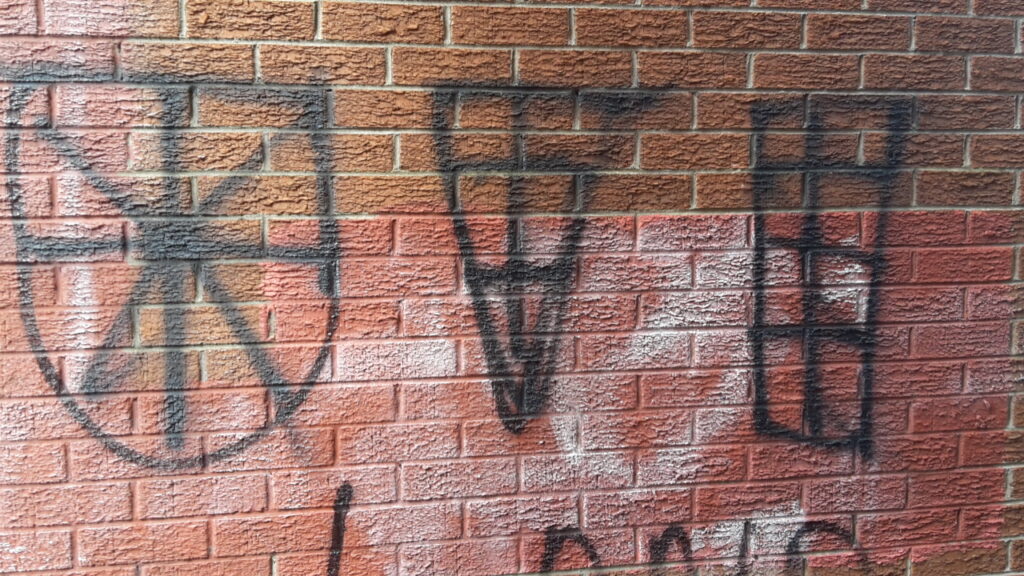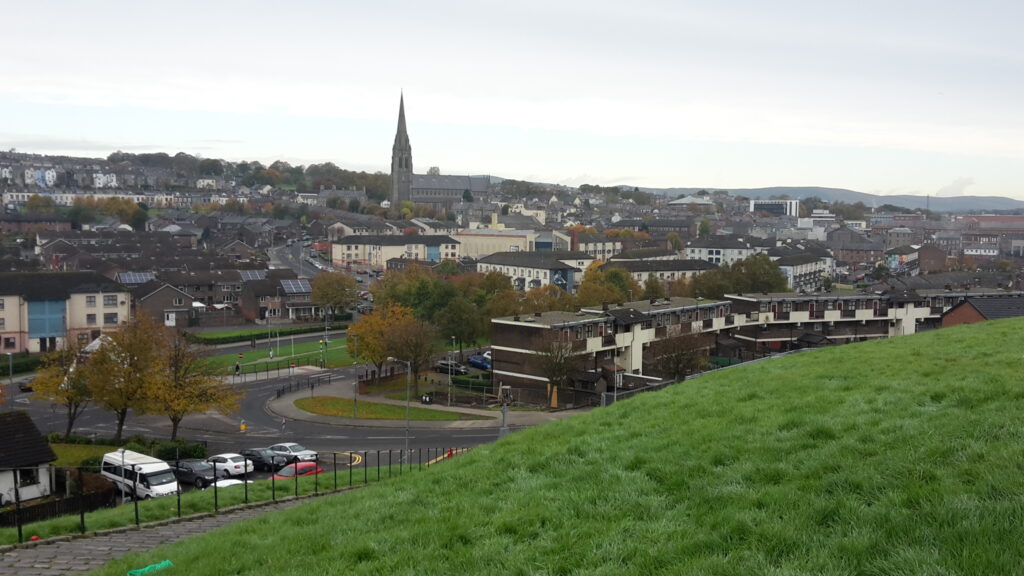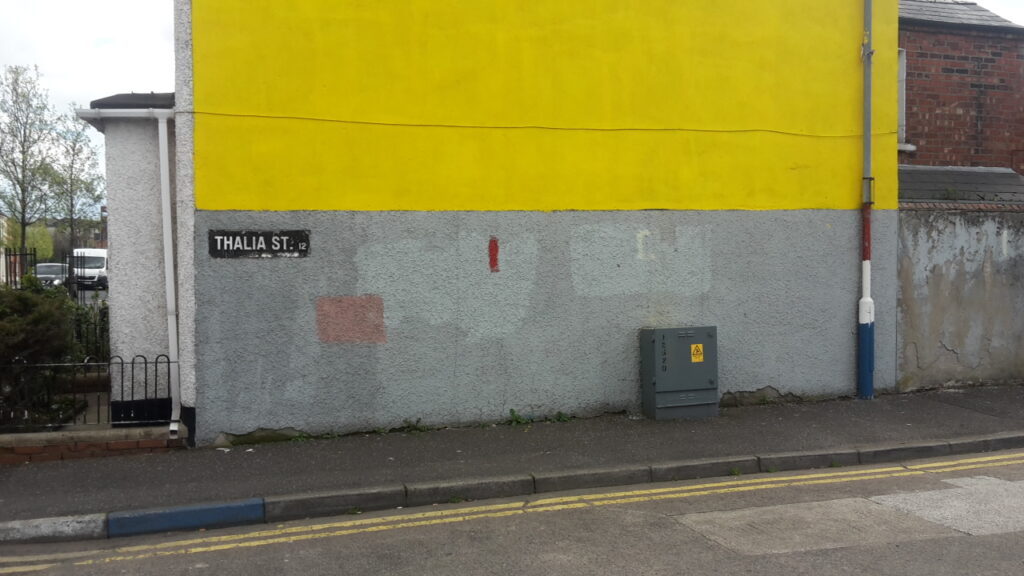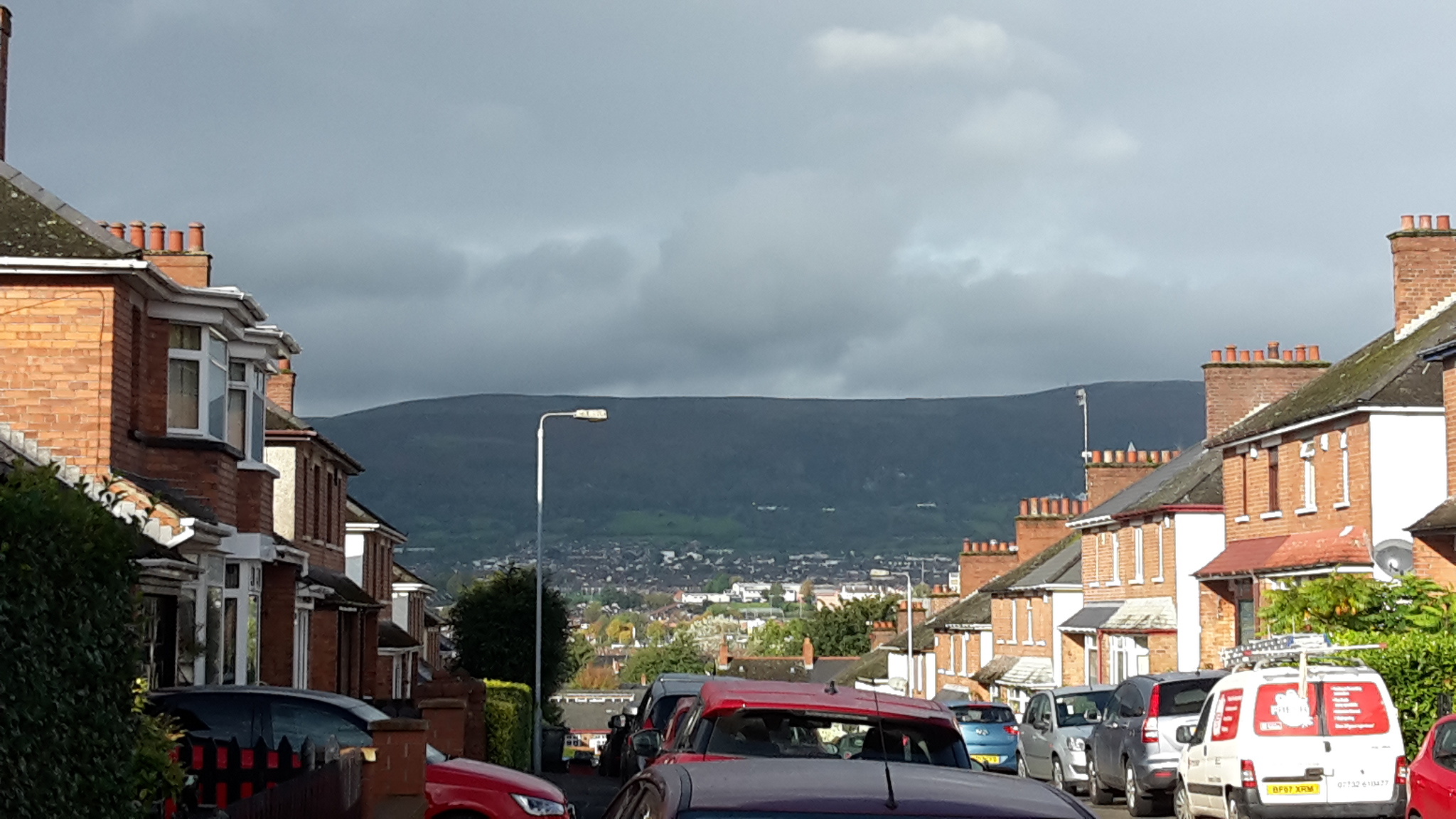A girl leapt a few feet into the air and spread her arms. Not to fly, but to complete a balanced landing on a little juice box. It exploded, and the orange substance spread defeated onto the pavement of Derry, Northern Ireland. The teenager cried out in a cartoonish voice, right after a theatrical gasp: “someone got shot!” Could this lightheartedness be proof that Northern Ireland is leaving the Troubles behind? And who exactly is capable of truly knowing what the Troubles were – and are? To gather data for my master thesis, I stayed in the country during the autumn of 2019.
The same old theme since 1916?
So what is Northern Ireland anyway? Is it truly a country? Yes and no. Through bouts of armed insurrection that started with the 1916 Easter Rising, and civil disobedience the south of Ireland obtained its de facto national independence from the United Kingdom in 1922. The North, populated mostly by unionist protestant Ulster1Historically Ulster was Ireland’s northern-most province. Today, Northern Ireland is made of six of Ulster’s historical nine counties. The protestants in the north of Ireland wanted a common ethnic denominator that was not Irish and not ‘mainland’ British. Ulster became the region around which they built their identity British people, rather than nationalist Irish catholics, remained connected to Britain. However, the London government ironically granted the North a kind of semi-independence as well, with its own parliament and cabinet. Enter the statelet of Northern Ireland.
Many aspects of Northern Ireland were undemocratic. It was exclusively governed by the Ulster British protestant majority; catholics lived in more crowded neighbourhoods; voting rights were in some instances based on owning a house, which many catholics did not; neither did they have equal opportunities on the labour market, as the government allocated new industries to protestant areas. Some unionists did try to reform and give catholics more political power, like Terence O’Neill.
Whether this prime minister’s (1963-1969) intentions were really reform-minded and emancipatory, remains a debate. Instead, he might have thought of local protestant business as a “spent force”, and looked across the border for new industries to be invited.2Paul Bew, Peter Gibbon & Henry Patterson, Northern Ireland 1921-2001: Political Forces and Social Classes (Serif: London, 2002 (First published in 1996)), 103-107. But more importantly, traditionalist strands within unionism appeared stronger and unwilling to shake off these old ways. Especially loyalist extremists, who in the 1960s began to reorganise and rearm, regarded any form of corporate internationalism as a threat, and allowing Irish emancipation as treason. Republicans eventually acted likewise. The objective of these Irish nationalist extremists was not primarily to democratise Northern Ireland, but to bomb it into unification with the south. Economic class politics had given way to competing nationalisms, and subsequently, the vicious Troubles.3Simon Prince, Northern Ireland’s ’68: Civil Rights, Global Revolt and the Origins of the Troubles (Irish Academic Press: Newbridge, Co. Kildare, 2018 (First published in 2007)).

Shackled to lunatics
Fast forward to a key event of 2019: me stumbling into Kelly’s Cellars with a friend. Although above ground level, the establishment was cold as heck, and so the name remained appropriate, I guess. This Belfast pub supposedly was a meeting place for the organisers of the 1798 rebellion, and still is a place oft visited by Irish ‘rebels’, nationalists and republicans. The Good Friday Agreement concluded the Troubles in 1998 and turned ethnicity into a choice and question, instead of a given at birth. But in this pub, Irish remained the dominant identity. As I stood at the bar, someone softly uttered a complaint in my ear: “I’m shackled to a lunatic”. Peeking sideways in confusion, I saw a short man, neatly dressed in a navy-style coat. His face resembled a wrinklier version of actor Billy Bob Thornton as he appeared in Fargo. And by his thinning dark hair, I judged he must have been in his late fifties. A woman of equal age whirled around in the background, clearly having a good old night out.
Drinking and talking had made her voice raspier, though not unfriendly. If anything, she was making merry conversation with nearly everyone in the cellars. Except with the husband. Perhaps he needed a change of scenery and therefore set himself down with me. The two-way interrogation could begin. Yes, I am from the Netherlands. No, that doesn’t mean I’m a great fan of William III, like loyalists who revere this Dutch king of England, Scotland and Ireland (r. 1689-1702). But yes, I do have an interest in Irish history and politics, that’s why I’m here. I hope to finish my studies with a thesis on the Troubles.
Yes, he answered, he was a republican, who was “very deep in it”, meaning he had been very much involved with the Irish Republican Army (IRA) back in the day. Such was unsurprising, as was the pride with which he bore his past. We were in the cellars, after all. “Taking out the Shankill Butchers, that was us”.4The Butchers are an interesting case. This pack of loyalist murderers eventually became a problem for all major parties: they were obviously a problem for the RUC, the police, as the Butchers’ extremely vicious murders (sometimes involving hatchets) had to be stopped; republicans hated them for killing catholic civilians at random; and the loyalist leadership often got into fatal power struggles with them as they were uncontrollable. Some were caught by the RUC. But remarkably, leading loyalists provided the IRA (!) with intelligence to take out some of the Butchers. See for example this interview in the Belfast Telegraph. But it got somewhat unsettling. In part because he professed about the unionists that “we’ll kick them out eventually”, even though “they would fight tooth and nail, oh aye”. Even more worrying was the calmness with which he expressed this belief.
To him, this was not a policy one could opt for or out of. Instead, it was an eternal truth inherent to reality and history that the Irish would fight the British, and the former will in the end drive out the latter. Mind: this populist interpretation of history often puts the beginning of the conflict in the 12th century. You might not remember, but it was then that Anglo-Norman knights crossed the Irish sea. That this happened under vastly different socioeconomic circumstances and in a cultural environment hardly imaginable to us is completely irrelevant to hardcore nationalists.
This was the kind of ideology that had turned political activism of the 1960s into the bombings and shootings of the decades thereafter. But I decided to keep my ecologist, socialist, liberal and inclusive views to myself. Yet, the republican and me did steer into conflict. The woman returned from her pub campaign. Somehow, outright, the two got into a short fight about whether one could truly describe what the Troubles were like. “I am explaining it to him now, right?”, claimed the husband. The wife now turned to me. Luckily, her glasses kept most of her stinging look in check. “You need to have lived here”, she concluded, angrily, and continued her partying. The man sighed.
I did spent it in good company
Perhaps I haven’t lived in Northern Ireland. No longer than a few months, that is. Nevertheless, it felt a bit off to just leave our conflict as it stood. So as we were about to part, I quietly recited The Parting Glass to the woman, and hummed its tune. Her frustrations with either my pretentiousness, or her own past life, or both, seemed to subside. “And all the harm that e’er I’ve done / alas it was to none but me.”
And eventually the song continues about how “I will rise”, and that you won’t. Or that I’ll die, and perhaps move on to a better world by easyJet plane. And that you’ll stay here, in this divided Belfast shite hole. It is a song popular at Irish and Scottish funerals after all. Whatever your interpretation, the woman and I did reach common ground. “I will gently rise and softly call / goodnight and joy be to you all.” Confused that some visiting student-foreigner just induced feelings of solemnity in her, she started hugging me. The Universal and the Irish briefly met, aided by the almighty powers vested in Guinness.
Anyhow. As if any one individual person could know the Troubles. Locals can be less capable of grasping the conflict in full, as they are burdened with the personal scars a nail bomb left when they were a teenager, and the traumatic flashbacks they still cause. Or the guilt felt because you survived where others did not, stacked upon the loss of loved ones. And to make matters worse: your loss is supposed to be someone else’s gain. In that case, finding time and energy for an Other’s pain might become hard. Outsiders have not felt the full force of the war. That might cause naivety, but can be turned into a possibility. They might learn enough to help create a common ground where a growing number of people can be understood.

A great notion, but of course a bit abstract. One concrete example of a huge and partly constructive outsider is the European Union. It funded nodes of historical memory both of the Irish nationalist community, for example the Museum of Free Derry; and Ulster British loyalist ones, among which the Orange Heritage sites. This is not a full solution. Loyalist citizens killed by the IRA are commemorated almost exclusively by loyalists. Irish nationalists seem to attract increasing but still only limited attention from their Ulster British neighbours. It is all the more ironic that both Northern Irish and Ulster British nationalists can be extremely skeptical about the internationalist EU.
Especially the loyalist community is more than upset that a border is being put in place in the Irish sea, scared that the mainland Brits will leave them stranded on the island with the Irish. No wonder over half of Northern Ireland voted to remain in the EU: Brexit was a problem imposed on its peoples by the government in London – in a manner of speaking as much an outsider. As comedian Patrick Kielty recently wrote: “…we’ve been told in Northern Ireland that we were someone else’s problem, that we were an inconvenience.” Instead, Northern Irelanders are being pressured by forces way greater than they themselves can muster. Actually, this is an example of collective victim blaming. How and to what extent can you hold them responsible for a violent past, the stereotypical images of its history, the weird Brexit referendum and a rift between London and Brussels?
An answer to that question will have to wait for now. But yes, the Troubles are over, if only because a peace treaty is in place. If anything, a new phase is being played out, as the contours of Brexit are taking shape and the EU’s new role and actions will be highly influential in the decade to come. All over Europe nationalisms remain strong. Yet, they are sharing the arena with progressive, multifaceted identities, including those based on gender and cultural diversity rather than ethnic homogeneity; and worldviews based on sociopsychological welfare and climate rather than financial wealth. And for the moment the current Irish border conflict is mostly being played out by words, hardly by any bombs or bullets. Even though these times can be filled with political frustrations and social desperation, remember that most times, like now, we are not killing each other.

